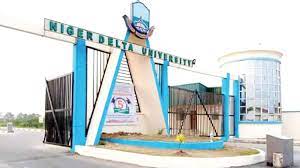Niger Delta University (NDU) is a prominent public university situated on Wilberforce Island in Bayelsa State, Nigeria.
Its inception dates back to 1992 when it was established under the leadership of Colonel David Jemibewon, who served as the then-military governor of the state.
Over the years, NDU has evolved into a dynamic institution of higher learning, with a clear commitment to providing quality education and training for its students, equipping them to face the challenges of the 21st century.
See Niger Delta University Courses Offered

NDU houses nine faculties, each offering a diverse range of academic disciplines.
These faculties are Arts, Education, Engineering, Environmental Sciences, Humanities, Law, Management Sciences, Natural and Applied Sciences, and Pharmacy.
The comprehensive array of faculties underscores the university’s dedication to offering a broad spectrum of educational opportunities.
The university is not only focused on traditional education but also serves as a hub for research and innovation.
It boasts numerous research centers and institutes engaged in cutting-edge research across various fields.
This commitment to research contributes to the university’s growth and enhances its standing in the academic community.
NDU is known for its vibrant and diverse community, welcoming students from all corners of Nigeria and beyond.
The university’s campus is a lively hub of activity, hosting various student organizations, clubs, as well as sports and recreational facilities.
This enriches the overall educational experience for students and fosters a sense of community.
Furthermore, NDU holds membership in the Association of Commonwealth Universities (ACU), which connects it to a global network of universities, facilitating academic collaborations and exchanges.
Notably, NDU has produced a notable list of alumni who have gone on to make significant contributions to politics, governance, and public service.
Some of these distinguished alumni include former Governor Seriake Dickson, current Senator Henry Seriake Dickson, current Governor Douye Diri, current Deputy Governor Lawrence Ewhrudjakpo, and prominent political figures like Timi Alaibe, Godswill Akpabio, Rotimi Amaechi, Babatunde Fashola, Kayode Fayemi, and Adams Oshiomole.
Niger Delta University (NDU) may be a relatively young institution, but it is rapidly evolving with a promising future.
Its commitment to providing quality education, fostering research and innovation, and nurturing a diverse and dynamic community solidify its position as a significant player in Nigeria’s higher education landscape.
NDU’s dedication to preparing students for the challenges of the 21st century underscores its pivotal role in the region and the nation as a whole.
See List Of Universities That Accept 140 Cut Off Mark
Niger Delta University (NDU) School Fees:
The school fees at NDU vary depending on the level of study and the specific program.
This approach allows flexibility to cater to the diverse academic offerings at the university.
here’s a breakdown of the estimated school fees:
Undergraduate Programs:
- Humanities and Social Sciences: School fees range from ₦50,000 to ₦70,000.
- Business and Management Sciences: School fees range from ₦60,000 to ₦80,000.
- Engineering and Technology: School fees range from ₦70,000 to ₦90,000.
- Medical Sciences: School fees range from ₦100,000 to ₦150,000.
Postgraduate Programs:
- Humanities and Social Sciences: School fees range from ₦70,000 to ₦90,000.
- Business and Management Sciences: School fees range from ₦80,000 to ₦100,000.
- Engineering and Technology: School fees range from ₦90,000 to ₦110,000.
- Medical Sciences: School fees range from ₦120,000 to ₦200,000.
It’s essential to note that these figures are approximate estimates, and the actual school fees may vary based on the specific program and the financial status of the student.
To obtain the most accurate and up-to-date information on school fees, students are advised to contact the NDU admissions office.
Additional Fees: In addition to the basic school fees, students at NDU are required to cover various other fees, including but not limited to:
- Acceptance Fee
- Tuition Fee
- Development Levy
- Student Union Fee
The total cost of attendance for NDU students is estimated to fall within the range of ₦100,000 to ₦300,000 per academic year.
These additional fees contribute to the overall educational experience and support various campus activities and initiatives.
See University of Delta School Fees
Niger Delta University (NDU) School Fees :
| Level | Program | School Fees Range |
|---|---|---|
| Undergraduate | Humanities and Social Sciences | ₦50,000 – ₦70,000 |
| Undergraduate | Business and Management Sciences | ₦60,000 – ₦80,000 |
| Undergraduate | Engineering and Technology | ₦70,000 – ₦90,000 |
| Undergraduate | Medical Sciences | ₦100,000 – ₦150,000 |
| Postgraduate | Humanities and Social Sciences | ₦70,000 – ₦90,000 |
| Postgraduate | Business and Management Sciences | ₦80,000 – ₦100,000 |
| Postgraduate | Engineering and Technology | ₦90,000 – ₦110,000 |
| Postgraduate | Medical Sciences | ₦120,000 – ₦200,000 |
Please note that these figures are approximate estimates, and the actual school fees may vary based on the specific program and the financial status of the student.
To obtain the most accurate and up-to-date information on school fees, students are advised to contact the NDU admissions office.
Additional Fees: In addition to the basic school fees, students at NDU are required to cover various other fees, including but not limited to:
- Acceptance Fee
- Tuition Fee
- Development Levy
- Student Union Fee
The total cost of attendance for NDU students is estimated to fall within the range of ₦100,000 to ₦300,000 per academic year.
These additional fees contribute to the overall educational experience and support various campus activities and initiatives.
Financial Aid and Scholarships: NDU recognizes the importance of making education accessible and offers a range of scholarships and financial aid opportunities to assist students in affording the cost of tuition.
Students seeking information on scholarships and financial aid can refer to the NDU website for detailed guidance and application procedures.
See JAMB CBT Centers Approved for Registration in Niger State
Conclusion
NDU’s tiered fee structure accommodates a wide array of academic programs, making higher education accessible to a diverse student body.
While these estimates provide a general overview, prospective and current students are strongly encouraged to reach out to the NDU admissions office for precise and up-to-date information on school fees and financial assistance options.
In conclusion, Niger Delta University (NDU) is dedicated to providing quality education while maintaining a flexible fee structure that considers various academic programs and levels of study.
school fees range depending on the chosen program and academic level, ensuring accessibility for a diverse student body.
While these figures are approximate estimates, students are advised to contact the NDU admissions office for precise and up-to-date information on school fees.
Additionally, students should be aware of other associated fees, such as acceptance fees, tuition fees, development levies, and student union fees, which contribute to the overall cost of attending NDU, estimated to fall within ₦100,000 to ₦300,000 per academic year.
NDU is committed to supporting its students through scholarships and financial aid opportunities, further enhancing access to quality education.
For detailed information on financial assistance, students are encouraged to refer to the NDU website.
In essence, NDU strives to make higher education accessible and affordable while maintaining its commitment to academic excellence and diversity within its student community.
SEE ALSO OTHER TOPICS:
University of Niger School Fees
Prince Abubakar Audu University School Fees
Kano University of Science & Technology School Fees

Hello, I’m Prince, a versatile creator in the world of the web. As an article writer, I weave words into compelling stories and informative pieces that engage and inform. Simultaneously, I’m a web developer, crafting digital experiences that come to life on the internet. With a passion for both writing and coding, I thrive on combining creativity and technology to bring ideas to fruition. Join me as we explore the limitless possibilities of the digital realm.





